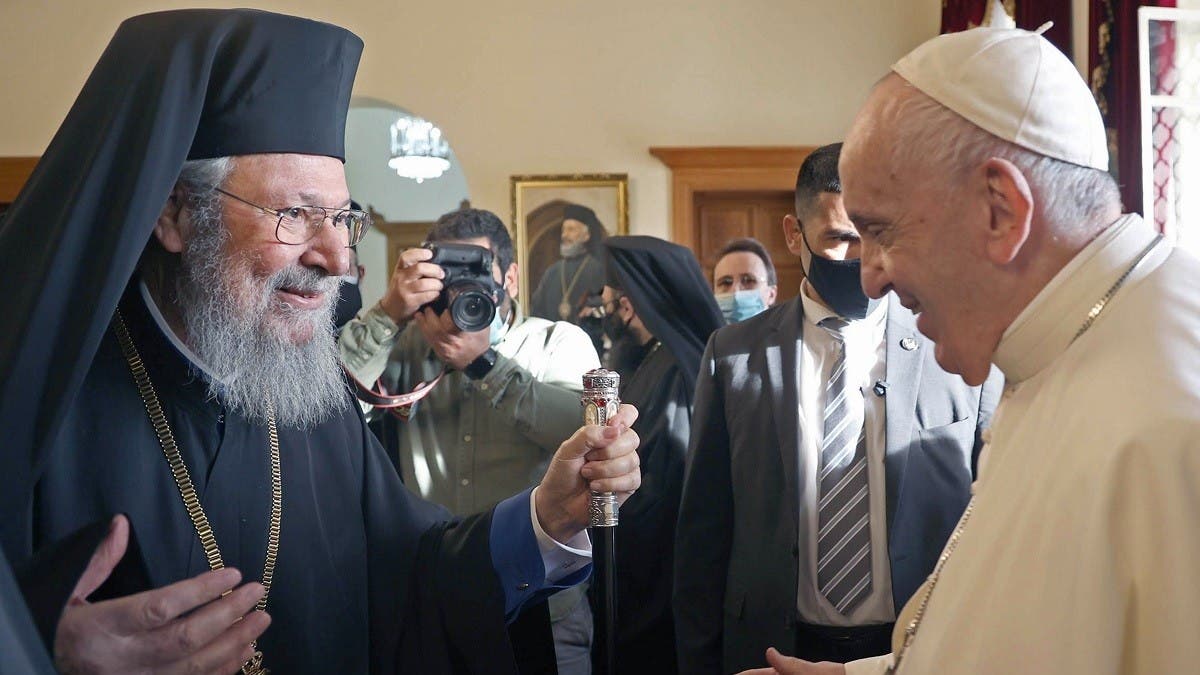Pope Francis called on Friday for healing during an outdoor Mass in Cyprus within sight of a huge Turkish Cypriot flag on a mountainside on the other side of a line that has divided the island for nearly half a century.
Francis began his first full day in Cyprus at a meeting with leaders of the Orthodox Church, the biggest Christian community on the island. There, Francis again expressed a desire for eventual unity between the Eastern and Western branches of Christianity, which have been split since 1054.
For the latest headlines, follow our Google News channel online or via the app.
There are only 38,000 Catholics on the island, making up about 4.7 percent of the population and for many the Mass at the stadium was the highlight of the pope’s two-day visit.
Many of the 10,000 worshippers were Filipinos who work in Cyprus, mostly as housekeepers. The Philippines is Asia’s largest Catholic country.
The pope wove his homily around the theme of healing and shared pain – topics that touch a chord with all Cypriots on an island that has been split in two since a 1974 Turkish invasion triggered by a Greek-inspired coup.
“Healing takes place when we carry our pain together, when we face our problems together, when we listen and speak to one another,” Francis said.
Countless mediation attempts on Cyprus have failed and the peace process stalled in 2017 when talks collapsed. Tens of thousands of Greek and Turkish Cypriots remain internally displaced.
The huge Turkish Cypriot flag painted into the mountainside, which is lit up at night, is a constant reminder of division.
Archbishop raps turkey
Francis is visiting only the south of the island, controlled by the internationally-recognized Cypriot government. A Turkish Cypriot breakaway state in northern Cyprus is recognized only by Ankara.
Shortly after the pope arrived on Thursday, the leader of the self-styled Turkish Republic of Northern Cyprus invited Francis “with my most sincere feelings” to visit his side of the island too.
“It is my hope and expectation that Pope Francis responds positively to our invitation and treats all believers on an equal basis, as he has repeatedly stated,” Ersin Tatar said in a statement.
At his meeting with the pope, Cyprus’ Orthodox Archbishop Chrysostomos II attacked Turkey.
Many Christian places of worship were converted to mosques, priceless icons and relics smuggled abroad, and place-names changed in the aftermath of the conflict.
“Not only did they imitate the blood-thirsty Attila, but they exceeded him,” Chrysostomos told Francis, referring to a fifth century ruler of the Huns and an enemy of Christianity.
“In this holy and just struggle … we would like your active support,” Chrysostomos said.
Francis called for the restitution of sacred objects to their legitimate owners in a speech on Thursday.
The Vatican’s own relations with mainly Muslim Turkey, which the pope visited in 2014, have sometimes been difficult.
Last year, the pope said he was deeply pained by Turkey’s decision to make a mosque of Istanbul’s Hagia Sophia museum, which was once a Christian cathedral.
In 2015, the pope angered Turkey when he said the killing of up to 1.5 million Armenians in World War One was “the first genocide of the 20th century.”
Turkey, which denies accusations of genocide, recalled its ambassador to the Vatican in protest.
Read more:
At least 29 asylum seekers land on Greece’s Lesbos before Pope Francis visit
Pope Francis says ‘greatly concerned’ over Lebanon crisis
Turkey recalls ambassador over pope's Armenia genocide words

 World3 years ago
World3 years ago
 World3 years ago
World3 years ago
 Business12 months ago
Business12 months ago
 Entertainment7 years ago
Entertainment7 years ago
 World7 years ago
World7 years ago
 Entertainment7 years ago
Entertainment7 years ago






